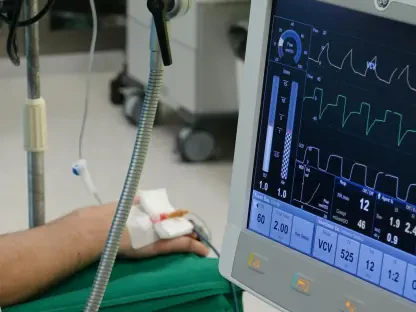In today’s conversation, we dive into the intricate world of cardiac electrophysiology and innovations in medical technology with James Maitland. Known for his expertise in robotics and IoT applications within medicine, James offers invaluable insights into Boston Scientific’s recent developments and FDA approval concerning their Farapulse system. This breakthrough allows a wider pool of patients, particularly those with persistent atrial fibrillation, to benefit from a novel approach that stands out from traditional methods. Our discussion explores the nuances of the Farapulse system and its implications for the future of atrial fibrillation treatment.
Can you explain the significance of the recent FDA approval for Boston Scientific’s Farapulse system for patients with persistent AFib?
The FDA approval for Boston Scientific’s Farapulse system marks an important milestone in the treatment of persistent atrial fibrillation. Patients with AFib lasting more than seven days often struggle to find effective solutions due to the limited efficacy of drug therapy. Now, they have access to a technology that not only broadens treatment eligibility but also offers a potentially safer method of managing this complex condition. This approval is a stepping stone towards providing more comprehensive care options for a group that makes up a substantial portion of all AFib cases.
How does the Farapulse system differ from traditional cardiac ablation methods in terms of safety benefits?
Traditional cardiac ablation methods typically use either heat or extreme cold to create small scars on the heart tissue, aiming to block the irregular electrical signals that cause AFib. The Farapulse system, utilizing pulsed field ablation (PFA), employs nonthermal energy to achieve similar outcomes without the thermal risks associated with conventional techniques. This approach potentially reduces complications such as collateral damage to surrounding tissues while maintaining or even enhancing the effectiveness of the ablation.
What were the primary safety and effectiveness goals met by the Advantage AF clinical trial that supported the label expansion?
The Advantage AF clinical trial was crucial in demonstrating the safety and effectiveness of Farapulse technology, particularly in persistent AFib cases. The primary goals included proving the system’s capacity to effectively isolate pulmonary veins and achieving posterior wall ablation in circumstances where drug therapy fails. With these objectives successfully met, the trial provided robust evidence supporting the label expansion, solidifying Farapulse’s role in addressing complex arrhythmia cases.
Since the Farapulse system has been a growth driver for the company, how has it impacted Boston Scientific’s electrophysiology business so far?
Since its introduction, the Farapulse system has driven significant growth within Boston Scientific’s electrophysiology sector, far surpassing initial projections. The traction gained from both the initial FDA approval for paroxysmal AFib and the recent label expansion showcases the increasing acceptance and demand for PFA technology. This growth indicates a shift in electrophysiology practices, with more physicians opting for safer, innovative solutions, thereby propelling Boston Scientific’s business and setting new standards in AFib treatment.
What percentage of all AFib cases does persistent AFib represent, and why is it important to expand treatment options for this group?
Persistent AFib constitutes approximately 25% of all AFib cases, representing a significant patient population needing effective treatment alternatives. Expanding options for this group is crucial due to the frequent ineffectiveness of traditional drug therapies over extended periods. With persistent AFib leading to heightened stroke risks and reduced quality of life, offering advanced technologies like Farapulse can steer patients towards healthier outcomes and improved management of their condition.
Could you explain how PFA technology works and how it differs from other cardiac ablation techniques?
PFA technology operates by delivering targeted electrical impulses directly to the heart tissue without using thermal energy. This method disrupts the erratic signals causing AFib while sparing surrounding tissues from the potential damage associated with conventional thermal ablation methods, such as burning or freezing. As a result, PFA offers a unique, safe modality that captures the precision of electrical impulses without the collateral damage tied to temperature extremes.
Why is the nonthermal energy approach of PFA considered beneficial for treating AFib?
The nonthermal energy approach of PFA is considered beneficial due to its capacity to minimize risks of damage to adjacent structures like the esophagus or phrenic nerve, which can often occur with thermal methods. By avoiding extreme temperatures, PFA provides a more refined control over ablation boundaries, reducing post-procedural complications and potentially speeding up recovery times. This innovation in energy application demonstrates how safety can be prioritized alongside effectiveness in treating AFib.
Boston Scientific plans to study the Farapulse system in new clinical trials. Can you detail which patient groups will be included and why?
Boston Scientific is expanding its research to include patient groups who require continued ablation intervention, such as those needing redo procedures or treatment for complex arrhythmias. These cases still heavily rely on thermal ablation, and introducing Farapulse’s PFA technology could redefine treatment protocols. By focusing on these groups, the trials aim to establish PFA as the preferred choice, enhancing efficiency, safety, and outcome consistency across varied and complicated conditions.
What are the future plans for Farapulse in international markets, and when do you anticipate receiving the CE mark and other approvals?
Boston Scientific is actively pursuing international expansion of the Farapulse system, anticipating receiving the CE mark for Europe along with approvals in Japan and China in the coming months. These certifications will be instrumental in introducing PFA technology to a broader audience, facilitating global growth and adoption of safer, advanced AFib treatment options. The timeline for these approvals is promising, reflecting the momentum and confidence in the technology’s efficacy and international acceptance.
What are the specifics of the new clinical trial evaluating the Farawave catheter for posterior wall ablation?
The new clinical trial focusing on the Farawave catheter aims to validate its effectiveness in posterior wall ablation and pulmonary vein isolation. Encompassing around 375 patients across 40 centers in the U.S. and Asia, the study will assess patients who have experienced AFib recurrence following prior ablation treatments. By doing so, the trial seeks to strengthen the evidence supporting Farawave’s use in recurring and challenging AFib cases, ensuring the system’s adaptability and success across varied patient scenarios.
How will the study assess the adjunctive use of the Farapoint catheter for other ablation procedures?
The study will evaluate the adjunctive role of the Farapoint catheter in cavotricuspid isthmus ablation and left atrial ablation of the mitral isthmus, expanding the scope of the Farapulse’s applications. Through rigorous assessment within the same patient population, the trial will explore how Farapoint complements Farawave’s capabilities, potentially elevating treatment efficiency and efficacy. This dual evaluation promises integrated solutions for complex arrhythmias, broadening the therapeutic reach of PFA technology.
How does Boston Scientific plan to address the use of thermal ablation in complex arrhythmia cases moving forward with PFA technology?
Boston Scientific intends to transition complex arrhythmia cases towards exclusive reliance on PFA technology by demonstrating its superior safety profile and effectiveness in ongoing clinical trials. While thermal ablation has traditionally been the go-to method for challenging cases, the ongoing validation of PFA may redefine standard practices, encouraging a shift to nonthermal solutions. By emphasizing studies that illustrate PFA’s advantages, Boston Scientific aims to establish it as the primary choice for safe and effective arrhythmia treatment.
Do you have any advice for our readers?
For readers interested in medical advancements, it’s essential to follow developments in technology applications like the Farapulse system that redefine standard procedures. Stay informed about clinical trial results and regulatory updates to understand how they potentially impact patient care and the broader healthcare landscape. Embrace curiosity and remain open to the transformative potential these innovations bring to medicine, particularly in areas where traditional solutions fall short.









